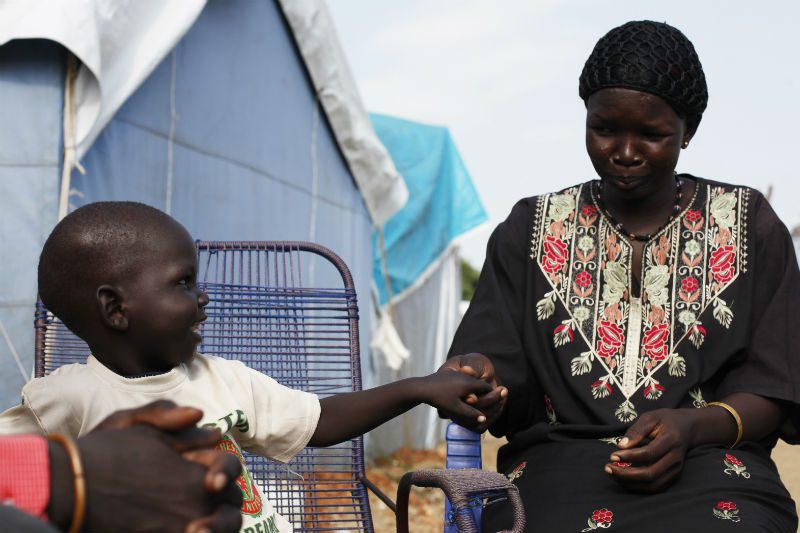
Kulang* was only days old when South Sudan was thrust into existence as the world’s newest country three years ago. For Kulang’s parents, Elizabeth and Gatluack Choul, an independent South Sudan offered hope and prosperity for their baby boy. But today that dream lies shattered.
Kulang and his family now live trapped in a displaced peoples’ camp while fighting continues to rage on across their homeland.
The events of the last seven months are in stark contrast to the family’s experience of independence this time three years ago. Peace had finally come after decades of brutal fighting and bloodletting in Africa’s longest running civil war. The country, and Kulang’s parents, celebrated for weeks on end.
“Celebrations began from the referendum, then when independence came, everyone was so excited. I remember me and my husband were very happy”, said Kulang’s mother Elizabeth.
Tens of thousands killed.
But then cracks started to appear within the ruling political party, leading to a full-blown fallout between the president and his former deputy.
By mid December last year, the argument had escalated into violence that quickly took on an ethnic dimension. Now, tens of thousands of people have now been killed, more than 400,000 people have fled into neighbouring countries, and another 1.1 million have been internally displaced inside South Sudan.
Kulang and his parents are now confined to a camp for displaced people in a UN compound. Up high on the southern side of South Sudan’s capital, the camp is a couple of miles wide across rocky, dusty ground and is guarded by armed UN peacekeeping troops. With frequent downpours of rain and temperatures soaring into the high thirties, there is little relief for Kulang’s family — nor for the 18,000 other people crammed into the camp.
“I am ashamed of being a father here.”
Elizabeth cooks the family’s meals outside on a miniature stove, using charcoal given to her by Oxfam and food by the World Food Programme. The family can never afford to supplement their rations with meat, usually having plain starchy meals made using a grain called sorghum, which can give Kulang stomach problems.
Kulang is bright and self-confident, known in the camp for bossing adults about and instructing them to play with him, especially his favourite game football.
“I was thinking Kulang would lead a better life when he was born in independence, I thought he would have better chances,” says his father, Gatluack.
“Being a father is always about being able to provide for your son, sending him to school or a good hospital if he needs it. But how can you say you’re a father when you’re just sitting here? I am just ashamed of being a father here.”
“The most important thing for my Kulang will be if South Sudan can go back to normal, for Kulang to go to school and be educated. That was my hope for Kulang. Without it he will be in danger,” says Gatluack.
“I do not want to be a soldier.”
Gatluack says that he hopes people beyond South Sudan in the international community will provide more humanitarian assistance and continue to push for a sustainable peace in the country: “The world needs to support people in their lives so South Sudan can be developed and there can be peace in this world.”
It’s likely that even if peace can be reached soon, South Sudan will require substantial humanitarian and political support from the international community well beyond its third birthday.
At present, the UN appeal for aid to South Sudan is less than half funded and the risk of famine could mean the disaster spirals out of control.
But while Kulang’s future may be uncertain, he is sure of his own plans. “I do not want to be a soldier,” he says “I want to be a doctor.”
Oxfam is on the ground in South Sudan and has so far reached over 260,000 people with food, clean water, sanitation and cash assistance to buy essential items, as well as supporting thousands of refugees who have fled to Ethiopia and Uganda.
Provide food, clean water and urgently needed aid to refugees
*All names have been changed for protection.
